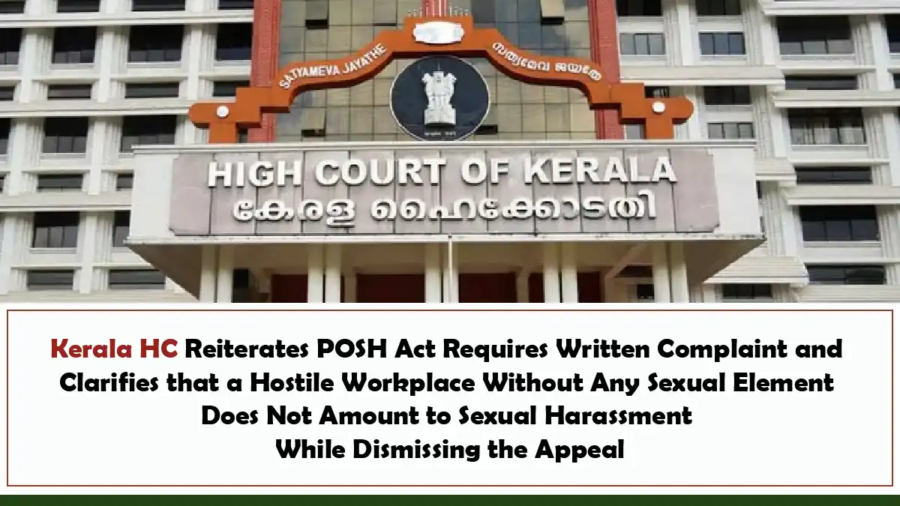Kerala HC Reiterates POSH Act Requires Written Complaint and Clarifies that a Hostile Workplace Without Any Sexual Element Does Not Amount to Sexual Harassment While Dismissing the Appeal
Facts of the Case
The matter arose from a dispute involving Amstor Information Technology (India) Pvt. Ltd. and its Managing Director, who was the first respondent. The appellant, a former employee of the company, was terminated from service on 07.11.2017. She challenged her termination before the Labour Court. Parallelly, the first respondent instituted a suit before the Munsiff’s Court, Thiruvananthapuram, seeking to restrain the appellant from trespassing into the company premises. In the meantime, an anonymous complaint was forwarded to the District Collector, Thiruvananthapuram, making allegations against the first respondent. This complaint was referred to the Local Level Committee constituted under the POSH Act, 2013. The Committee, after conducting an enquiry, directed the first respondent to apologise, pay ₹19 lakhs as compensation, and establish an Internal Complaints Committee. Acting on this recommendation, the District Collector issued a compliance directive. The first respondent approached the High Court challenging the Committee’s proceedings on grounds of lack of jurisdiction and violation of natural justice. A single judge quashed the report and the Collector’s directive. The appellant then filed a writ appeal before a division bench of the Kerala High Court.
Contentions of the Petitioner (Appellant)
The appellant argued that the single judge erred in interfering under Article 226 of the Constitution, since the first respondent had an alternative statutory remedy under the POSH Act. She submitted that her labour dispute did not disentitle her from protections under the Act, and the findings of the Local Committee were based on credible evidence. Her counsel insisted that the Local Committee was convinced that the respondent’s behaviour, including spreading rumours, abusive conduct, and creating a hostile work environment amounted to sexual harassment under the Act. It was further contended that denial of benefits under the POSH Act merely because she pursued remedies before the Labour Court was unjustified.
Contentions of the Respondent (Managing Director)
The first respondent contended that the proceedings of the Local Committee were fundamentally flawed. He argued that no written complaint was ever filed as required under Section 9 of the POSH Act and Rule 6 of the 2013 Rules. The complainant herself had disowned the anonymous complaint, distancing from its contents. The allegations raised by her were in the nature of labour disputes, non-payment of salary, termination of employment, and alleged hostile treatment and did not fall within the statutory definition of sexual harassment under Section 2(n) of the Act. It was further argued that the Committee violated principles of natural justice by recording witness statements telephonically without affording him the right to cross-examine them. Such a process, he submitted, vitiated the enquiry and rendered the report unsustainable.
Court’s Observations
The Division Bench, comprising Justice Raja Vijayaraghavan V and Justice K.V. Jayakumar, upheld the single judge’s decision. The Court emphasised that “Section 9 of the Act and Rule 6 of the Rules mandate that a complaint shall be in writing. The oral statement made before the Committee, after distancing herself from the original anonymous complaint, cannot be accepted as a substitute for the written complaint contemplated under Section 9 of the POSH Act.” It noted that the appellant had filed multiple complaints before the police, the Women’s Commission, and the Labour Court, and hence “it cannot be contended that the appellant was incapable of submitting a written complaint to the Local Committee.”
On the scope of “sexual harassment,” the Court held that “Her allegation was that the 1st respondent created a hostile work environment, behaved in an unfair and cruel manner, and ultimately denied her salary and terminated her service but without any unwelcome acts or behaviour which may be tantamount to sexual harassment as defined under Section 2(n) of the Act. These acts, evidently, are connected to a labour dispute rather than constituting sexual harassment as defined under the POSH Act.”
The Bench further noted serious procedural irregularities. Witnesses were examined telephonically, and the respondent was denied the opportunity of cross-examination. Citing Maneka Gandhi v. Union of India (1978) 1 SCC 248 and Mohinder Singh Gill v. Chief Election Commissioner (1978) 1 SCC 405, the Court reiterated that denial of cross-examination violated fundamental principles of natural justice. Referring also to State of Orissa v. Dr. (Miss) Binapani Dei, AIR 1967 SC 1269, it held: “If the essentials of justice be ignored and an order to the prejudice of a person is made, the order is a nullity. That is a basic concept of the rule of law.”
The Court rejected the appellant’s argument that the writ petition was not maintainable due to the availability of alternate remedy, holding that “the existence of an alternative remedy does not operate as an absolute bar where there is violation of natural justice, or where proceedings are wholly without jurisdiction.”
Court’s Order
The Division Bench dismissed the writ appeal, affirming the single judge’s order. It quashed the Local Committee’s report dated 22.08.2018 and the consequential communication issued by the District Collector on 19.09.2018. The Court held that the Committee had acted in contravention of statutory provisions and in violation of natural justice. Conclusively, it ruled that allegations relating solely to hostile work environment and unfair treatment, without any sexual element, fall outside the purview of the POSH Act.
Written by Adv. Deeksha Rai



